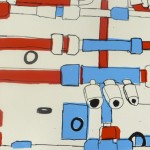Human experience, mobility and translation
 |
 |
 |
 |
 |
 |
| Beginnings | Endings | Home | Work | Learning | Relations |
We often imagine that we belong to only one culture, but human experience is almost always, in some sense, transnational. Though cultures tend to consider themselves as separate entities defined in terms of nation, language, tradition or history, they are necessarily in a state of perpetual evolution. As cultures come into close proximity, then the ways in which they interpret the world are translated into other forms of understanding reality. Through this process, the web of concepts, traditions and modes of perception that constitute a given culture develop. It is through the process of negotiation and accommodation that new cultural forms are created, changing the material world that surrounds us but also the internal world of the individual – his or her subjective experience.
The life stories of people belonging to Italian communities in different parts of the world, or of people who have recently come to live in Italy, are shaped by the particularity of local circumstances and by a multiplicity of events occurring both within the public and the private sphere. Despite these manifold differences, all these life stories are nevertheless characterized by the everyday practice of negotiating multiple languages, by diverse investments in national identity, and by the losses and gains of cultural translation.
The experience of moving between cultures that is shared by all these communities is captured in the many kinds of representation – photographs, journals, literature, autobiographies – that people who belong to these communities have produced. The negotiation between one cultural practice and another is part of the everyday reality that is framed in this extremely wide ranging body of work. Yet, the translation of one culture into the terms of another is most intense when key moments that define an individual’s being in the world are represented. The media collection brings together visual and textual representations of beginnings and endings, home and work, learning, and relations.













